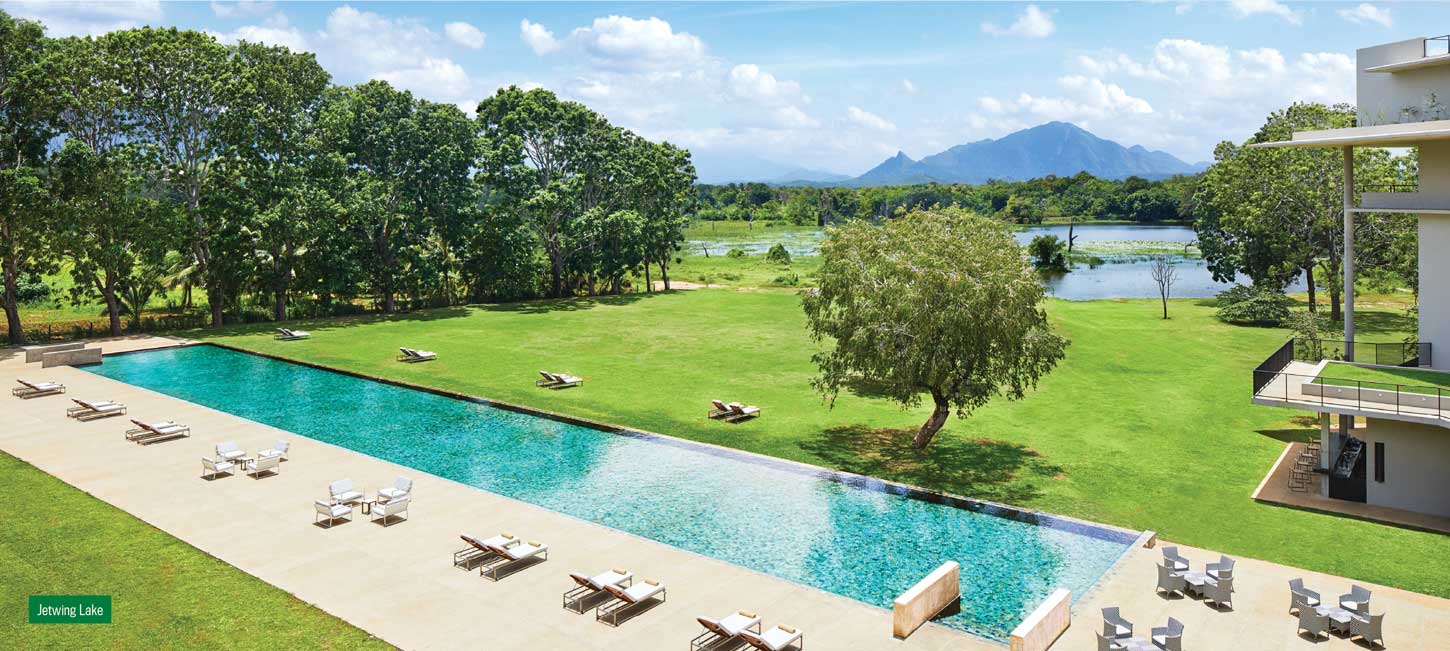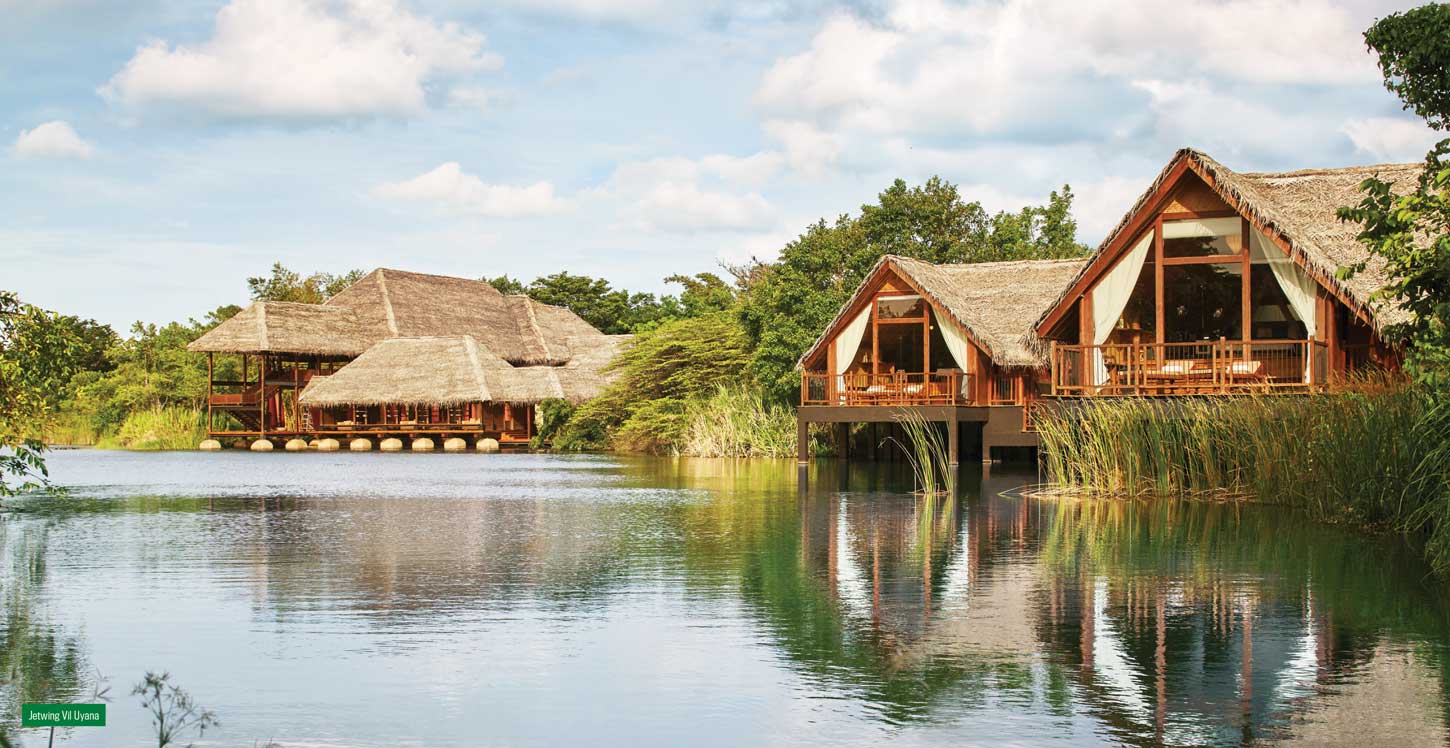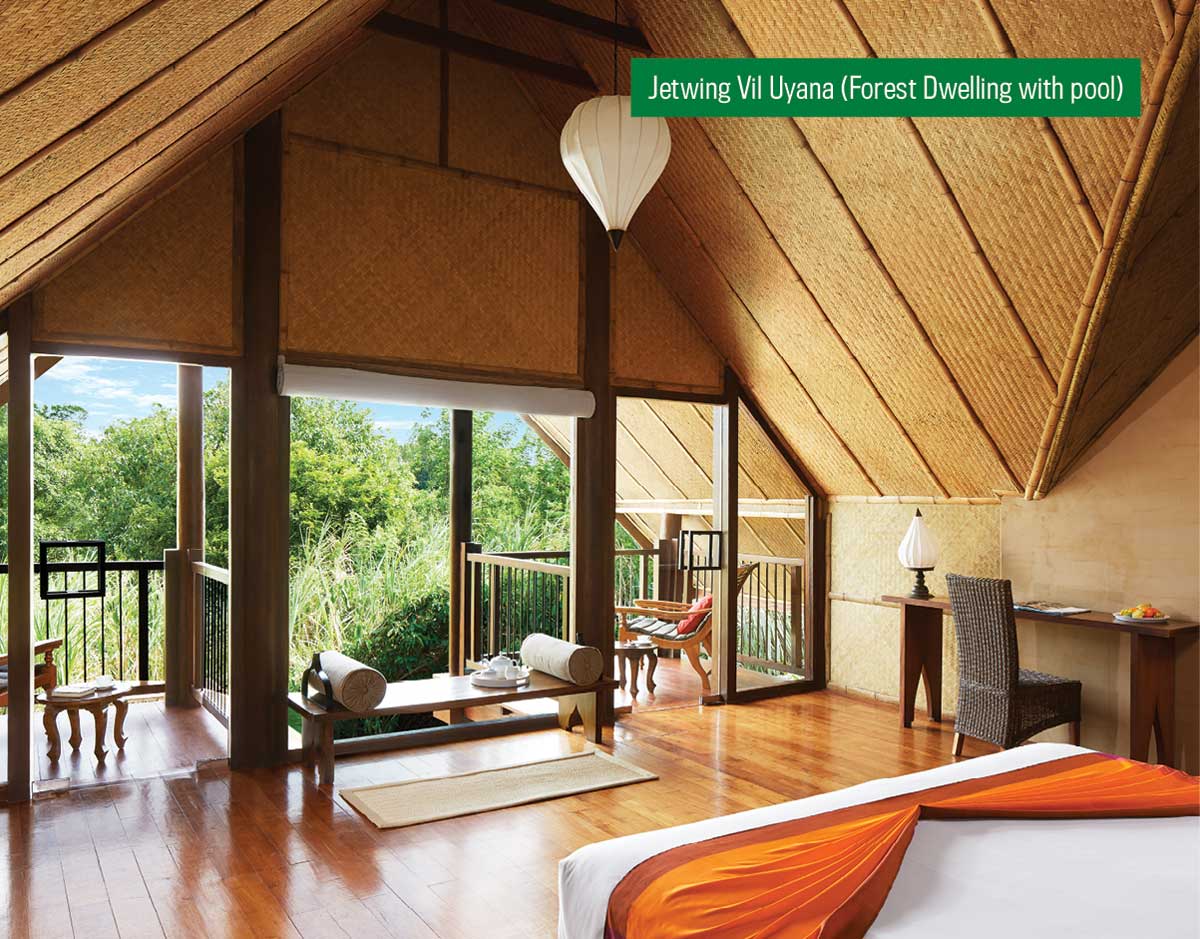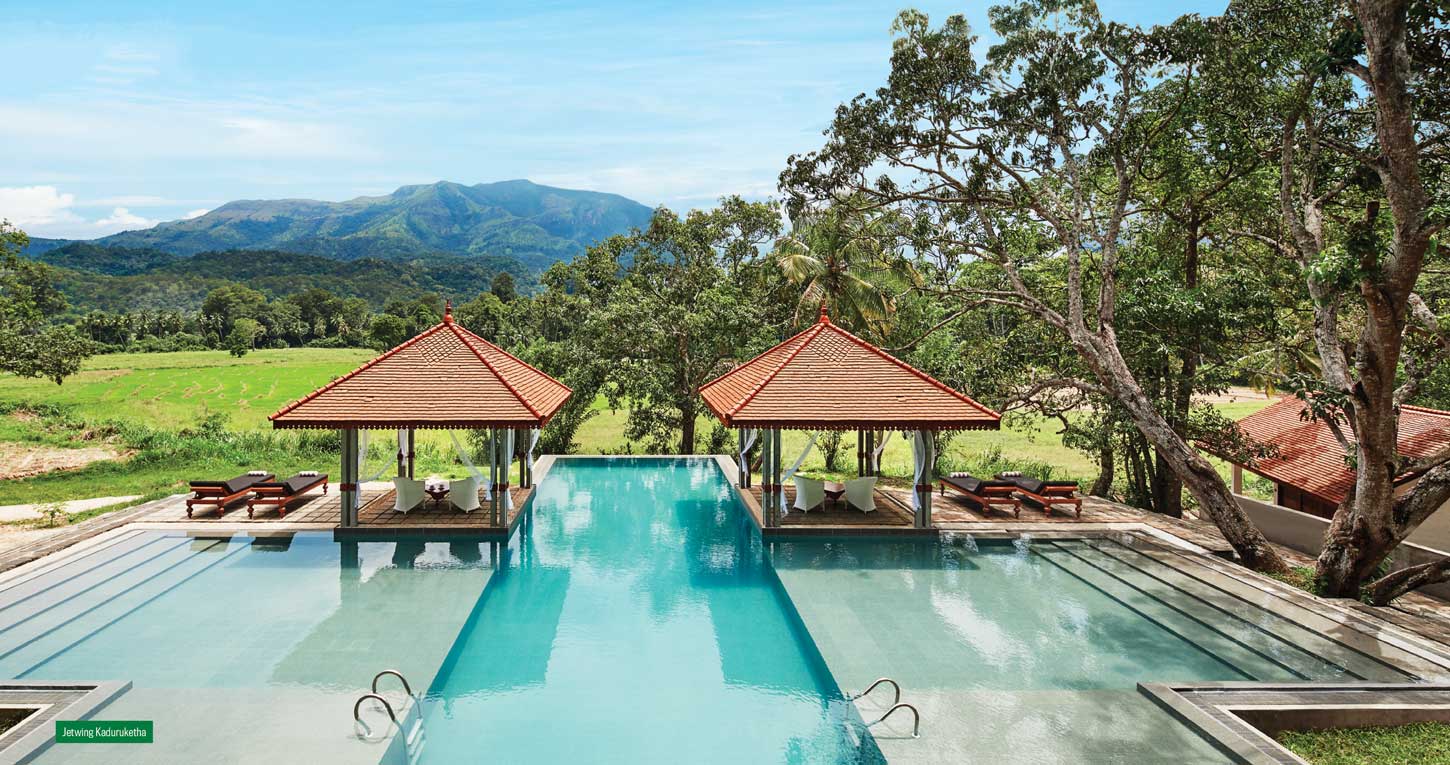SPONSOR PROFILE
JETWING HOTELS
Sustainability has been a way of life for Jetwing Hotels since before the term was popularised in the world of hospitality.
Emanating from the vision of its founding Chairman Herbert Cooray, who believed in entwining the ethos of community, environmental upliftment and luxurious hospitality, the 50-year young chain of hotels is renowned for integrating sustainability into its diverse array of operations.
The chain’s modus operandi, cemented on a sustainable path to growth focussing on the four Ps – people, planet, profits and peace – is a fitting formula for hospitality in a world battling climate change, environmental degradation and social inequalities. The group is passionate about creating a butterfly effect by sharing its sustainability story with the world to help create a better future for the planet by inspiring change.

Manager – Sustainability
Manager of Sustainability at Jetwing Hotels Sashika Kaluwahewa explains: “Our unique philosophy of the butterfly effect is helping us escalate sustainability at all our properties by adopting a holistic mindset and integrating a variety of sustainable practices as a part of our daily operations.”
“Sustainability is not only good for the environment – it also makes sound business sense, providing tangible and intangible benefits. This approach helps us consolidate our brand as an ethical and responsible one. With more travellers making inclusive and greener choices when it comes to consumption tourism, our brand distinctively stands apart from the rest in Sri Lanka with a unique offering for a guilt free holiday,” she notes.
The Jetwing Sustainability Strategy is built upon six key pillars: energy and carbon; water and waste; biodiversity; community and culture; family; and sourcing and production.
These pillars are brought to life in the group’s assortment of hotels, resorts and boutique properties around the island, be it in handcrafting organically grown single estate artisanal tea, rewilding barren lands into thriving nature reservations or upskilling youth in rural Sri Lanka to become revered hoteliers, to name a few of its countless initiatives.
While all Jetwing properties have vast green footprints, Jetwing Kaduruketha, Jetwing Vil Uyana and Jetwing Lake are perhaps three of the most sustainable in its portfolio, in Sri Lanka and perhaps around the world.
“Sustainability is not only good for the environment – it also makes sound business sense, providing tangible and intangible benefits
Jetwing Kaduruketha
Set amidst 50 acres of lush paddy fields at the foothills of the looming mountains in Wellawaya, Jetwing Kaduruketha is an eco-resort that offers tradition inspired agro-luxury that celebrates a centuries old way of life in Sri Lanka. A perfect marriage of natural beauty, abundant biodiversity and farming culture, the resort not only elevates the hearts and souls of guests who visit, but empowers the lives and livelihoods of its local residents.
Kaluwahewa explains the concept behind the resort’s community upliftment philosophy: “In Sri Lanka, paddy farmers traditionally till lands owned by others, and are unable to escape the cycle of debt and hardship. As the owner of 50 acres of paddy lands, Jetwing Kaduruketha relooked at this relationship through a humane lens to uplift these farmers.”
She elaborates: “The resort works with 30 farmer families who farm its paddy fields, extending seed money to them at the beginning of the paddy cultivation season. The difference is that the farmers don’t have to repay this working capital to Jetwing post-harvest. Instead, they share the harvest with the hotel and are free to make a profit off their share of the paddy, thereby keeping them from falling into debt in the case of a poor harvest.”
The community and culture pillar is practised at Jetwing Kaduruketha to promote culture in an equitable manner by empowering community livelihoods for sustainable impact. Thrive – which is a grassroot project piloted at the property – enables hotels to work closely with local suppliers and upscale their home enterprises, by extending financial assistance and sharing technical knowledge to help deliver high quality products and services.
In addition to having its organic paddy farming practices certified by the Sri Lanka Standards Institute (SLSI) and being committed to upholding Sri Lanka’s rich paddy heritage, Jetwing Kaduruketha has gone a step further to encourage farmers to cultivate heirloom rice varieties.
“The resort is also focussed on reviving heirloom paddy varieties, traditional farming knowledge and pest management practices with no chemicals,” Kaluwahewa says, adding that “this has led to the native flora and fauna thriving in the area.”
“Through a combination of… sustainability initi- atives, Jetwing Lake has been able to shrink our carbon footprint and reduce overall negative operational impacts
This property contributes immensely to the group’s biodiversity pillar, where it ensures the preservation of its natural ecosystems through direct conservation and by creating awareness for wider stakeholders – including guests, staff and community members – to become conservation champions.
Its efforts have borne fruit in many forms including the abundance of wildlife to name one. The surrounding land has become home to species like the giant flying squirrel, baya weaver and even Sri Lanka’s elusive fishing cat, along with over 130 species of endemic, residential and migratory birds.
Jetwing Vil Uyana
One of Sri Lanka’s shining testimonies of how a built environment can mimic and revitalise a previously degraded natural habitat, Jetwing Vil Uyana is one of the sustainability jewels of Jetwing Hotels. Its name aptly translating to a ‘garden of lakes’ in Sinhala, this iconic property, which sits upon a once abandoned chena cultivated land and is surrounded by a man-made wetland, was built in homage to the ancient tank building traditions of Sri Lanka.
Kaluwahewa says: “The results of an initial biodiversity study conducted before construction compared to four years following the completion of the project show a sharp rise in wildlife numbers, indicating that Jetwing Vil Uyana has been a catalyst for enhancing biodiversity and demonstrating how the built environment has integrated into the natural environment.”
Jetwing Vil Uyana is home to a large diversity of fauna and flora, including over 160 resident and migratory bird species; nocturnal mammals such as civets and otters, and primates; reptiles and amphibians; and several species of butterflies, dragonflies and other invertebrates.
However, its most favoured and cherished animal remains the gray slender loris. From not having been recorded in the area to thriving with an ever-increasing population, this small, nocturnal primate is a mascot for Jetwing Vil Uyana.
Known and revered as the nurturing bosom that gave new life to the revival of the species, Jetwing Vil Uyana has become one of the best locations in Sri Lanka to spot one – or more – of these furry friends.
This remarkable achievement also led to the setting up of the Loris Conservation Fund, the on-site Loris Information Centre and a dedicated website to create greater awareness of this lesser known species.
Inspired by its loris project, Jetwing Vil Uyana is now carrying out a comprehensive study on fishing cats, which are endangered in the country. While little is known about their behaviour, the property’s dedicated fund is helping naturalists document the felines through trail cameras and behavioural studies.
The project has also been instrumental in setting up a public library in the village to benefit villagers as the hotel’s conservation efforts include educating other stakeholders on the importance of conserving biodiversity.
In addition to its flora and fauna-based initiatives, Jetwing Vil Uyana is also a practitioner of circularity. The property houses an effluent treatment plant – which enables it to reuse 100 percent of the wastewater generated across the premises – and an on-site biogas digester that is fed with daily organic waste from the kitchens and used to power staff kitchen stoves.
The resort goes further with organic farming – with an on-site farm growing a selection of regional fruits and vegetables that are used in its kitchens, ensuring that guests are nourished with the freshest organic produce native to the region.
Jetwing Lake
Situated bordering a panoramic lake in the vast central plains of Sri Lanka’s dry zone, Jetwing Lake is one of the group’s largest properties, which also has a massive sustainability impact on the environment thanks to its pioneering use of modern green technology.
The resort houses a 300 kilowatt (kW) solar photovoltaic system comprising 125 kW roof fixed panels and 175 kW ground fixed panels, which supply more than 40 percent of its daily electricity requirement. Efficiently harvesting solar energy throughout the year, the installation of bifacial panels at the hotel – which generate electricity from both sides of the panels – was the first such commercial project in Sri Lanka.
Kaluwahewa sheds light on the property’s centralised hot water system: “It enables us to produce hot water through 100 percent renewable energy, using a cinnamon wood-fired biomass boiler at nighttime and solar thermal panels to heat water during the day.”
“Apart from environmental benefits, the purchase of cinnamon wood provides additional revenue to cinnamon spice farmers as the wood is a byproduct – part of the tree left after the cinnamon bark has been harvested to make the spice,” she mentions.
Kaluwahewa continues: “The steam produced from the biomass boiler is used to provide hot water for use in the laundry and to drive the vapour absorption chiller used for air conditioning. This vapour absorption chiller consumes less than one-tenth the electricity of a conventional chiller and instead is powered by steam generated from a renewable energy source.”
Reducing its impact on the pristine environment surrounding the property, Jetwing Lake ensures that 100 percent of the wastewater produced at the hotel is treated through its on-site effluent treatment plant before being recycled for use within the hotel.
“Pursuing the butterfly effect is powering Jetwing Hotels to have a wider impact, and inspiring others in the local and international hospitality sector to follow suit
In addition, the hotel is committed to ensuring that its wastewater is toxin free through natural wastewater treatment processes that have been instilled in the design of the property to separate its treatment pathways for grey water, blackwater (sewage) and laundry wastewater.
For the treatment of solid waste, Jetwing Lake features a biogas digester where food waste from the restaurant and kitchen is fed to produce CH4 (methane) rich gas. The produced gas is supplied to the staff kitchen to power purpose-built biogas stoves. All the cooking at the staff kitchen is done through green energy, utilising biogas stoves along with biomass fired stoves.
Food waste and garden waste are also added to a composting plant, which produces a nutrient rich soil enhancer, which can be used in the hotel farm and gardens.
Minimising both plastic waste and the carbon footprint from transporting goods long distances, Jetwing Lake also features an on-site semi-automated water bottling plant, housed in a repurposed container. The plant cleans and refills glass water bottles for use at the hotel and nearby Jetwing properties, and has helped eliminate the use of plastic bottled water within the hotel.
“Through a combination of all these sustainability initiatives, Jetwing Lake has been able to shrink our carbon footprint and reduce overall negative operational impacts on the environment,” Kaluwahewa notes.
Future Outlook
Jetwing Hotels has over 50 years of sustainability experience under its belt, which propels the group to invest in pursuing the butterfly effect of making sustainable changes to the way humans treat the planet.
“Pursuing the butterfly effect is powering Jetwing Hotels to have a wider impact, and inspiring others in the local and international hospitality sector to follow suit,” Kaluwahewa says.
As Sri Lanka prepares to welcome increased tourist numbers in the coming years, Jetwing Hotels is committed to restarting energy projects and community outreach programmes that were delayed due to the economic crisis.
Going ahead, Jetwing Hotels is set to remain dedicated to the conservation of the biodiversity of the locality, always keeping it in mind when designing and expanding its properties.
Moreover, Jetwing has also been a pioneer of the naturalist concept in Sri Lanka’s hospitality sector to spread the word about the wealth of the country’s natural environment. Resident naturalists at the hotels take guests on guided nature and cultural excursions in and around the properties, as well as carry out awareness programmes for guests, associates and locals.
Like the flapping wings of the butterfly causing little changes to its surroundings that may lead to wider impacts, Jetwing Hotels’ sustainability initiatives have a resounding and positive impact on humanity’s efforts to conserve the planet for future generations.
Telephone 4709400 | Email reservations@jetwinghotels.com | Website www.jetwinghotels.com









